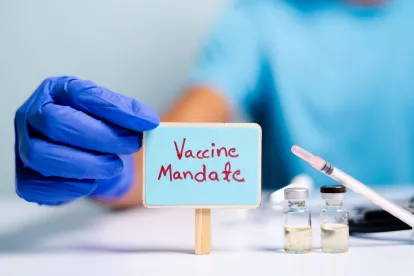Since the advent of the COVID-19 vaccines early in 2021, potential religious exemptions to mandatory vaccine requirements have been a challenging legal issue and focus of debate. Given that applicable federal, state and local laws generally require accommodation of an employee’s sincerely-held religious beliefs if they do not create an undue hardship on the employer’s operations, the highly personal nature of these issues in the context of vaccination mandates raises a unique set of issues. Those issues continue to evolve.
The Equal Employment Opportunity Commission (“EEOC”) has recently updated its guidance on religious accommodations applicable to COVID-19 vaccinations. Religious accommodation court cases contesting some vaccination mandates because they make no provision for religious exemptions are wending their way through the judicial system. And the highly anticipated Occupational Safety and Health Administration (“OSHA”) rule, requiring employers with 100 or more employees to require the vaccinations or weekly testing, is anticipated to be promulgated imminently. As with everything else involving COVID-19, religious accommodation issues are complicated and the legal requirements seem to change day by day.
Federal Guidance by the EEOC
On October 25, 2021, the EEOC issued updated and expanded technical guidance (the “EEOC Guidance”) concerning how Title VII of the Civil Rights Act of 1964, as amended applies when an employee requests a religious exemption to employer COVID-19 vaccination requirements. The EEOC Guidance highlights several key points:
-
Notice to Employer: Employees must inform their employer if they are requesting an exception to a COVID-19 vaccination requirement because of a conflict between that requirement and their sincerely-held religious beliefs, practices or observations. Employees do not, however, need to use “magic words” to so inform their employer.
-
Employer Response: Employers generally should assume that a religious exemption request is based on a sincerely-held belief; however, if an employer has an objective basis for questioning either the religious nature or the sincerity of a particular belief, the employer would be justified in making a limited factual inquiry (including how the employee’s religious belief conflicts with the employer’s COVID-19 vaccine requirement) and seeking additional supporting information.
An employee who fails to cooperate with a reasonable request for verification risks losing any subsequent claim that the employer improperly denied an accommodation.
-
Undue Hardship: Pursuant to the EEOC Guidance, an employer should thoroughly consider all possible reasonable accommodations, including telework and job reassignments. If an employer demonstrates that it is unable to reasonably accommodate an employee’s religious beliefs relating to a vaccine mandate without posing an undue hardship on its operations, then Title VII does not require the employer to provide the accommodation.
Courts have found undue hardship where, for example, the religious accommodation, if granted, would impair workplace safety, diminish efficiency in other jobs, or cause co-workers to carry the accommodated employee’s share of potentially hazardous or burdensome work. When considering workplace safety, an employer may consider such factors including the nature of the employee’s duties, the number of employees who are vaccinated, how many employees and non-employees enter the workplace and the number of employees who will need a particular accommodation.
-
Case-by-Case Assessment: An employer needs to assess undue hardship on a case-by-case basis by considering the specific facts of each situation. The employer is not required to provide the accommodation preferred by an employee if there are other possible reasonable accommodations. An employer can later reconsider an accommodation based on changing circumstances.
Certain State and Local Vaccination Mandates
Some state and local mandates, including New York State’s emergency regulation requiring most healthcare workers to be vaccinated as a condition of working on-site and interfacing with patients and co-workers, have been challenged through lawsuits due to the absence of religious exemptions to the mandatory vaccine. The results of those local challenges have been mixed. Some courts, including most recently the United States Courts of Appeals for the First and Second Circuits, have allowed the requirements to be enforced despite the lack of a religious exemption.
In Does 1-6 v. Mills, the First Circuit, in declining to bar Maine from enforcing its vaccination mandate for healthcare workers based on the failure to provide for a religious exemption, reasoned:
“We conclude that exempting from vaccination only those whose health would be endangered by vaccination does not undermine Maine’s asserted interests here: (1) ensuring that healthcare workers remain healthy and able to provide the needed care to an overburdened healthcare system; (2) protecting the health of those in the state most vulnerable to the virus—including those who are vulnerable to it because they cannot be vaccinated for medical reasons; and (3) protecting the health and safety of all Mainers, patients and healthcare workers alike. Maine’s three interests are mutually reinforcing. It must keep its healthcare facilities staffed in order to treat patients, whether they suffer from COVID-19 or any other medical condition. To accomplish its three articulated goals, Maine has decided to require all healthcare workers who can be vaccinated safely to be vaccinated.”
The appellate court noted that the Maine law did not single out religious objections to the vaccine “because of their religious nature.” The First Circuit also rejected plaintiffs’ injunction request based on Title VII’s religious accommodation requirements, explaining that plaintiffs would first need to exhaust their administrative remedies by filing a charge with the EEOC. Last week, the U.S. Supreme Court, on a 6-3 vote, refused to review the First Circuit’s ruling.
Addressing conflicting decisions issued by two U.S. district courts located in New York State, one filed in the Eastern District of New York and the other in the Northern District of New York, the Second Circuit, on October 29, 2021, in We The Patriots USA, Inc., et al. v. Kathleen Hochul et al., lifted a previously issued injunction, which had enjoined the State of New York from enforcing its mandatory vaccination regulation for healthcare workers without consideration of religious exemptions. We are awaiting the issuance of a detailed opinion setting forth the court’s reasoning in lifting the stay, which the Second Circuit stated would “follow expeditiously.”
While the New York and Maine cases are of limited precedential value, since they apply to a narrow set of rules applicable to healthcare workers, the implications are that courts are not necessarily requiring religious accommodations to COVID-19 vaccination mandates, where the statutes or regulations under court review do not require them. It bears emphasis, however, that the First and Second Circuits merely ruled that preliminary injunctions against enforcement of the state vaccination mandates for healthcare workers were not warranted. Both appellate courts have instructed the lower district courts to continue their consideration of the legal challenges to the state mandates raised by proponents of religious exemptions. The final chapters of those cases have not yet been written.
Takeaways:
It remains an open issue whether an employer may, or must, still consider religious accommodation requests pertaining to mandated COVID-19 vaccinations, particularly in light of statutory and regulatory reasonable accommodation requirements as well as the EEOC Guidance. Until the courts bring further clarity to this issue, it would be a potential legal risk for most employers to entirely disregard requests for religious exemptions to mandatory COVID-19 vaccines.
It is critical when a religious accommodation request has been received to review each situation on a case-by-case basis in view of any specific governmental rules applicable to an employer and its employees. Most employers should follow the updated EEOC guidance when evaluating, on a case-by-case basis, each request. Given that the EEOC continues to view an employee’s sincerely-held religious beliefs broadly, it may be safer for an employer to focus on whether an employee’s request for a religious exemption from the vaccination mandate would pose an undue hardship on the employer’s operations, based on the EEOC Guidance (which does allow for consideration of safety, employee vaccination rates, the number of requests, etc., as part of the “undue hardship” analysis).
All of these issues remain in flux and it will be very telling how, if at all, the forthcoming OSHA rule addresses these issues.
We will continue to closely monitor these developments




 />i
/>i


